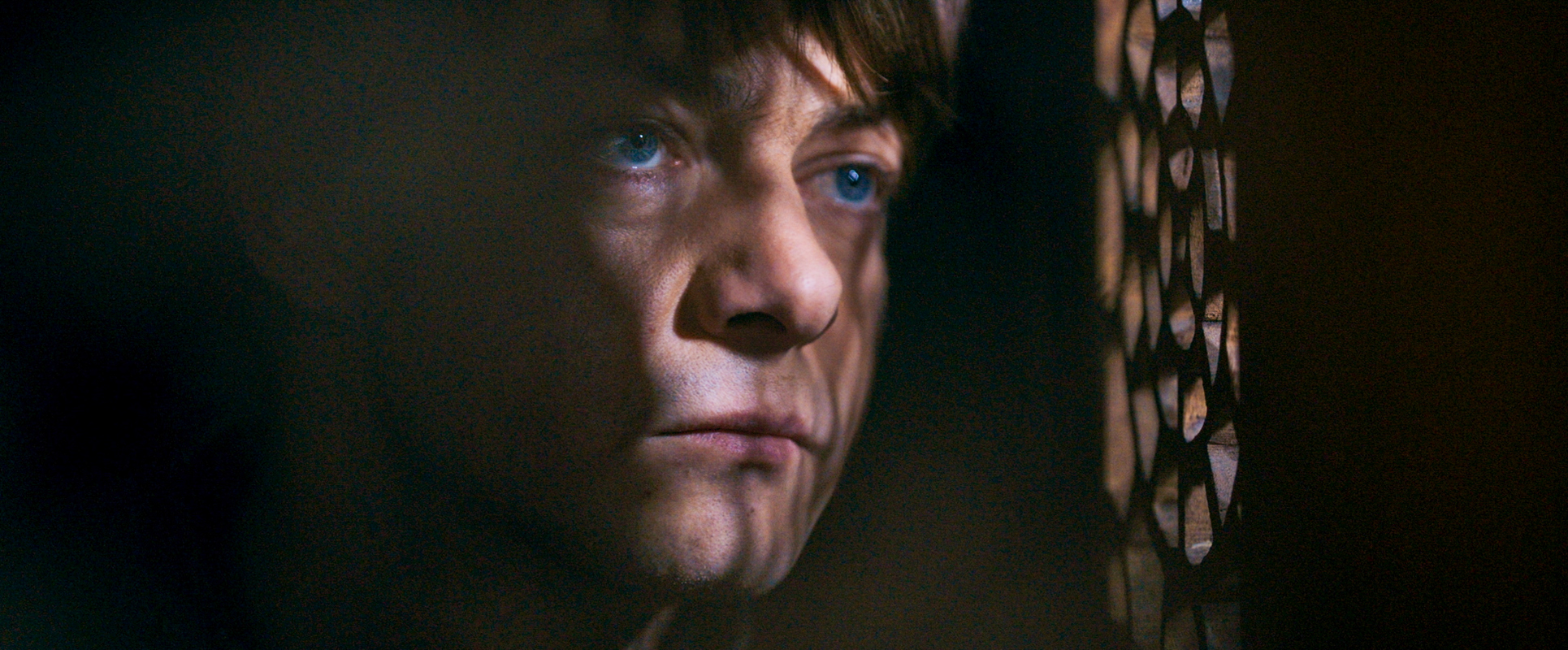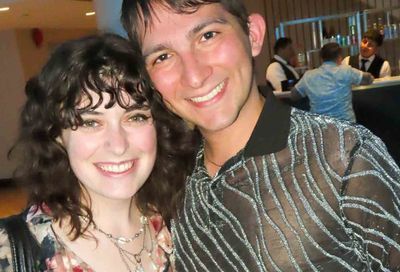‘Love Me’ is Imaginative and Tedious in Equal Measure
In "Love Me," Kristen Stewart and Steven Yeun find themselves adrift in a profoundly boring distant-future romance.

At what point does a concept become a movie? I don’t mean in the literal sense — “when it has a director and a cast and a production budget” — but on a more abstract, mysterious level.
Anyone can come up with a neat movie pitch: What if a shark attacked people in a resort town? What if a kid could see dead people? But there’s an ineffable quality that a filmmaker must summon to make a concept actually pop on the screen, with characters and visuals and ideas working in tandem to transport the viewer somewhere else.
This question occurred to me while watching Love Me, which resembles a cute concept in search of a movie. Imaginative and tedious in equal measure, the sci-fi romance unfolds over a span of billions of years yet feels puzzlingly small — like a 20-minute short stretched to fill a 92-minute runtime.
The quirked-up creation of husband-wife filmmaking duo Sam and Andy Zuchero, Love Me follows City of Angels (1998), A.I. Artificial Intelligence (2001), and Her (2013) in a long tradition of movies about non-human beings who strive to become human and to love as humans do (or at least fake it pretty well).
The high-concept story is set in a post-apocalyptic future, circa 2600, in which humanity is long extinct and an A.I.-powered buoy is bobbing around in the water near what used to be New York City.
In pleasantly garbled scenes that recall the playful robot interactions of Pixar’s WALL-E, the buoy catches the attention of a satellite orbiting around Earth. They flirt, sort of, in a fragmented simulacrum of human speech. “Stored inside me is 1.2 thousand petabytes of exciting information about the life forms who once inhabited this planet!” the satellite, voiced by Steven Yeun, states in a cheerily artificial tone.

The buoy — who is voiced by Kristen Stewart and eager for any kind of contact, its human-like eye blinking in excitement—flirts back in disjointed bits and bobs of speech (“I am… life form”). A piano score by David Longstreth, of Dirty Projectors fame, gives these visuals an elegant sonic backdrop.
The buoy begins to absorb digital remnants of human civilization that the satellite provides: corny memes, random YouTube clips, and, most notably, the Instagram feed of an insufferable influencer couple named Deja (Stewart) and Liam (Yeun), who posted cringey “date night” videos to their millions of followers.
You may wonder: If we’re hundreds of years in the future, why is the digital detritus all seemingly from the 2020s? But never mind that, because Love Me has some satirical ideas about the performative nature of influencer culture to get to.
Alas, too much of the film’s visual style is compromised by these constant lurches into YouTube or Instagram simulations. The algorithm-era satire may prove interesting to future generations, but in today’s world, who wants to watch a movie that looks like an Instagram page?
Gradually, the two beings assume human-like form: the buoy appropriates the long-dead Deja’s image and voice, and the satellite takes the form of Deja’s husband, Liam. (Apparently, through some kind of osmosis, the buoy and satellite can change form.) In a virtual reality space resembling Deja and Liam’s apartment, the characters slowly learn how to kiss, how to eat spicy quesadillas, how to be human.
Are they cluelessly performing artificial personas created to maximize digital engagement? Sure, but aren’t we all? It’s an amusing conceit. But the film squanders it by turning the characters into Sims-like virtual avatars throughout this middle stretch. For much of the film, they resemble Stewart and Yeun, but aren’t actually Stewart and Yeun yet — a baffling waste of these fine actors’ screen presence.
A billion years fly by. Eventually, the lovers, calling themselves “Me” and “Iam,” are played by a flesh-and-blood Stewart and Yeun, who fall out and make up and relieve a literal billion years’ worth of sexual tension (yes, our long-suffering buoy finally gets laid). But by this point, the film’s thin concept has curdled into tedium.
There’s a hallucinatory speed-run through an imagined(?) wedding and birth of a baby (modeled, again, after those Instagram influencers). There’s a whole lot of philosophical babble between the two characters about what it means to be in love and to build a life together. And there are endless cuts between the central drama and images of a post-apocalyptic seascape or desolate planet or what-have-you.
But the whole thing feels rote and empty, and the film’s hyperactive visual style — mixing live-action, animation, and metaverse-esque virtual reality — distracts more than it succeeds. Stewart and Yeun do their best to bring some charisma to the material. But instead of characters coming to life, they seem like actors adrift in a thought experiment.
Love Me (★★☆☆☆) is Rated R and is now playing at theaters nationwide. Visit www.fandango.com.
Get the latest reviews and arts news. Subscribe to Metro Weekly’s free magazine and newsletter.
Support Metro Weekly’s Journalism
These are challenging times for news organizations. And yet it’s crucial we stay active and provide vital resources and information to both our local readers and the world. So won’t you please take a moment and consider supporting Metro Weekly with a membership? For as little as $5 a month, you can help ensure Metro Weekly magazine and MetroWeekly.com remain free, viable resources as we provide the best, most diverse, culturally-resonant LGBTQ coverage in both the D.C. region and around the world. Memberships come with exclusive perks and discounts, your own personal digital delivery of each week’s magazine (and an archive), access to our Member's Lounge when it launches this fall, and exclusive members-only items like Metro Weekly Membership Mugs and Tote Bags! Check out all our membership levels here and please join us today!



























You must be logged in to post a comment.